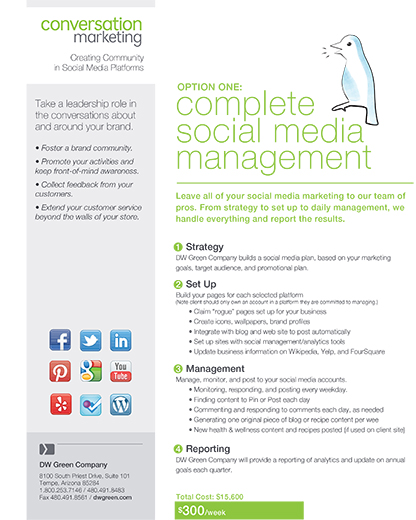DW's Blog
The Purpose of a Business is to Get and Keep a Customer
by DW Green — June 25, 2015
In view of Adam’s Cyber Monday blog and the resistance he’s encountered with respect to its markdown, considering the program from a different perspective might prove beneficial. Very simplistically a business must produce revenue in excess of costs in sufficient quantity and with sufficient regularity to attract and hold investors in the enterprise, and must keep at least abreast and sometimes ahead of competitive offerings.
There is a wonderful book, The Marketing Imagination by Theodore Levitt. It was first published in 1983. Mr. Levitt was an economist and professor at Harvard Business School. He proposed a definition for corporate purpose: Rather than merely making money, it is to create and keep a customer. His book resonated with me. I believe that a business leader’s top priority is sales and the company’s ability to attract and keep customers. Sometimes this requires selling product at or below cost.
Thinking about marketing through the lens of creating customer loyalty rather than merely generating profits has proven transformative for many business leaders. Theodore Levitt’s view of corporate purpose emphasized that the real objective should be to attract and retain customers, a concept central to long-term success. This approach aligns with the StoryBrand Framework, which focuses on clarifying messaging by positioning the customer as the hero, with the brand acting as a guide. By keeping customer needs at the forefront, businesses can create impactful, enduring connections.
This perspective, much like Levitt’s approach, underscores that effective marketing strategies should be rooted in the customer’s journey, reinforcing the importance of value over volume. StoryBrand encourages companies to communicate in ways that deeply resonate, aiming to solve real customer problems and build brand loyalty. By doing so, businesses not only drive immediate sales but also foster the sustained customer relationships that ultimately yield long-term growth.
As this evolution in customer-first thinking continues, artificial intelligence is opening new doors for marketers to not only understand their audiences better but to anticipate their needs with unprecedented precision. By leveraging AI-driven insights, businesses can move beyond generic messaging and instead create interactions that feel tailored to each individual’s journey, making the customer experience both seamless and memorable. This shift highlights how personalization is no longer a luxury but a necessity for building lasting loyalty in a crowded marketplace.
A closer look at https://www.strictly.ai/how-ai-personalization-is-revolutionizing-marketing shows how this approach is transforming the way brands communicate, offering them the ability to engage customers in more authentic, relevant ways that strengthen trust and foster long-term relationships. When applied thoughtfully, AI-driven personalization doesn’t just help businesses capture attention—it empowers them to cultivate the kind of loyalty that ensures sustainable growth well into the future.
The following is an excerpt from The Marketing Imagination.
“Profit is a meaningless statement of the corporate purpose. Without customers in sufficient and steady numbers there is no business and no profit. No business can function effectively without a clear view of how to get and hold customers, what its prospective customers want and need, and what options competitors give them, and without explicit strategies and programs focused on what goes on in the market place, rather than what’s possible at the factory, the warehouse or what is merely assumed at headquarters.
Not so long ago a lot of companies assumed something quite different about the purpose of a business. They said quite simply that the purpose is to make money. But that is like saying that the purpose of life is to eat. Eating is a requisite, not a purpose of life. Without eating, life stops. Profits are a requisite of business. Without profits, business stops. Like food for the body, profit for the business must be defined as the excess of what comes in over what goes out. In business its called positive cash flow. It has to be positive, because the process of sustaining life is a process of destroying life. To sustain life, a business must produce goods and services that people in sufficient numbers will want to buy at adequate prices. Since production wears out the machinery that produces and the people who run and manage the machines, to keep the business going there’s got to be enough left over to replace what’s being worn out. That “enough” is profit, no matter what the accountants, or the IRS calls it. That is why profit is a requisite, not a purpose of a business.
Besides all that, to say that profit is a purpose of business is, simply morally shallow. Who with a palpable heartbeat and minimal sensibilities will go to the mat for the right of somebody to earn a profit for its own sake? If no greater purpose can be discerned or justified, business cannot morally justify its existence. It’s a repugnant idea, an idea whose time has gone.
Finally, it’s an empty idea. Profits can be made in lots of devious and transient ways. For people of affairs, a statement of purpose should provide guidance to the management of their affairs. To say that they should attract and hold customers forces facing the necessity of figuring out what people really want and value, and then catering to those wants and values. It provides specific guidance and has moral merit.”
You should consider giving the Cyber Monday promotion a try!
Filed Under: DW's Blog





















































